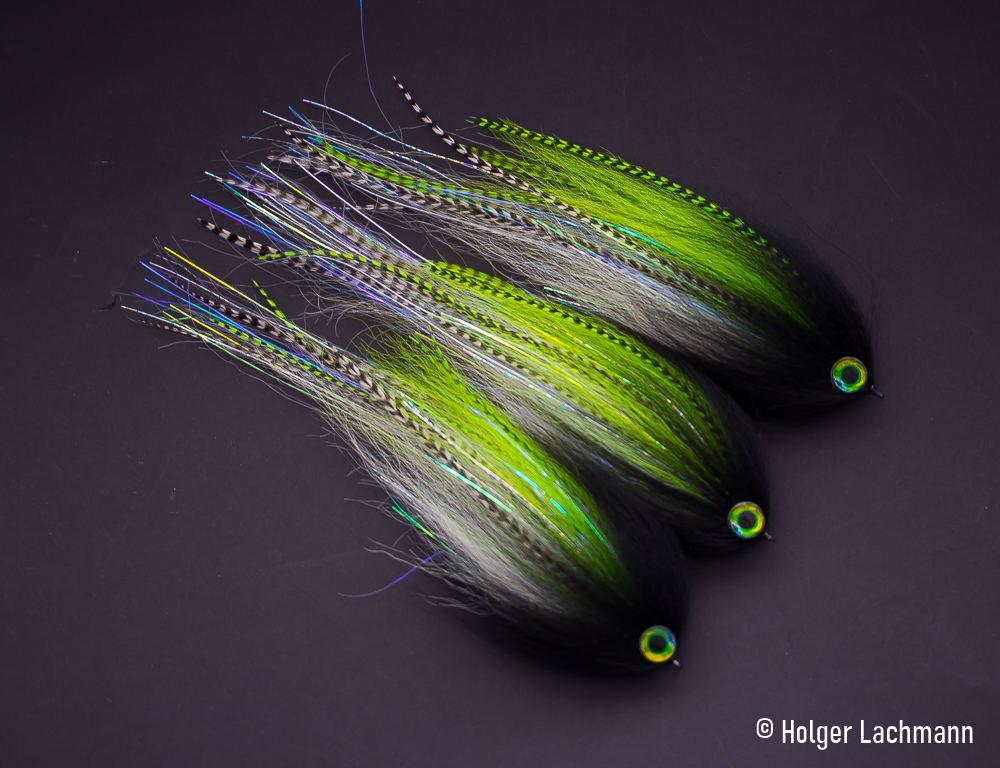
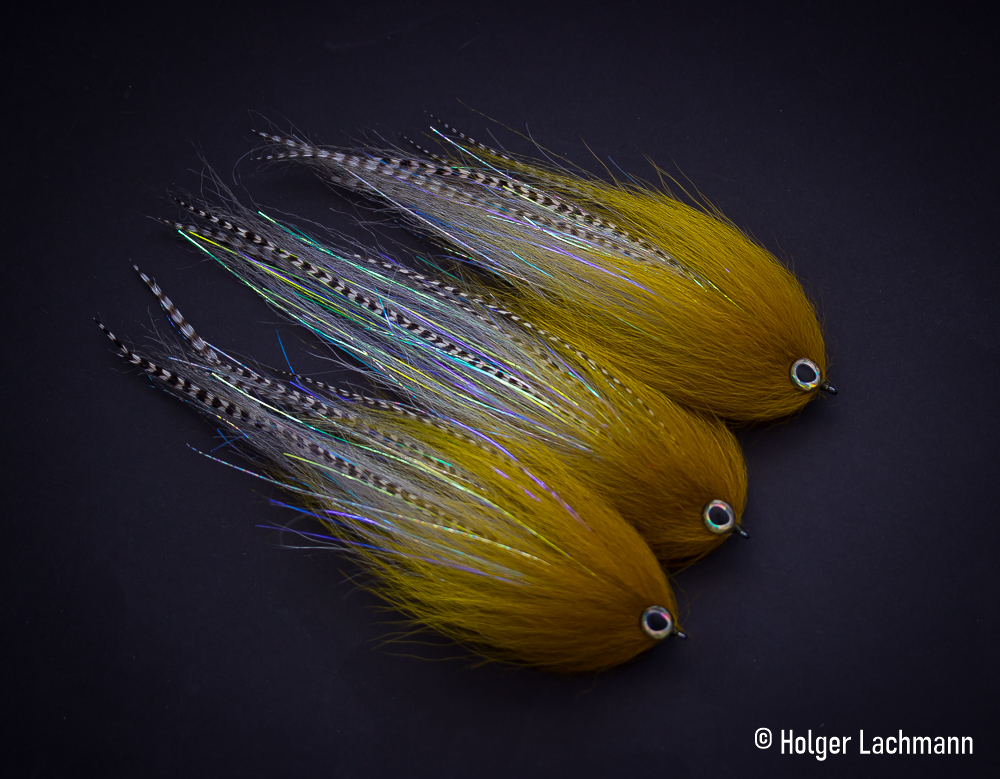
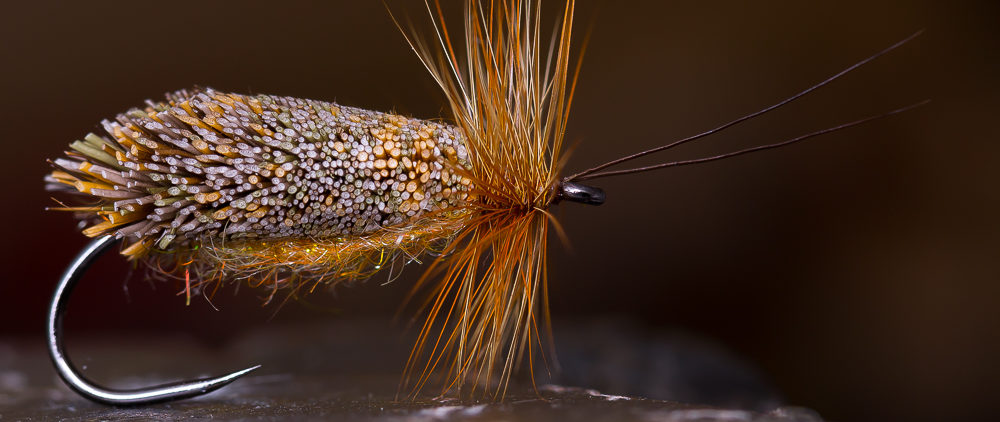


Finn Raccoon is an awesome material for big pike flies. The long, soft hair moves really well in the water. It’s also very durable. If you don’t use too much of the leather it’s also not so difficult to cast, because the hair will not soak as much as water as rabbit fur for example does. You can cast it with your 8weight and a pike taper line with no problems.
The color combination ist just an example. To be totally honest, for this fly, I used the materials from another old fly with a damaged hook. Recycling the fly tiers way! ;-)
The hook is a good topic! I got some samples from the danish company AHREX hooks. They got my attention, because they brought some really nice hooks for streamer and especially for sea trout fishing on the market. Now, they also got a Predator line with big sized hooks for predators like pike. The hook I’ve used is really nice. A white gap, a not too heavy wire and a small fine barb. You can also get it as a barbless version. That’s a pretty cool thing!
For this SBS, I tied the fly with a head of Senyos Laser Dub to give it more volume. It pushes a lot more water. On the other hand, it’s a bit harder to cast. There’s another way to tie it. Just some eyes with uv resin between them to secure everything like shown on the first picture with the black collar.
Put a drop of super glue along the hook shank and do a spiral wrap back and forth, back and forth, back and…. to create a solid basement for the other materials.
Tie in some mono for the ribbing. I’ve used 0,50 mm.
As „tail flash“, tie in some krinkle mirror flash in different lengths.
For the body, I’ve used one strand of orange cactus chenille and two strands of white polar chenille.
Twist the strands like shown and wind it around the hook shank and catch it with your tying thread.
Take the Finn Raccoon strip and tie it in at the front.
With the mono, rib the fur strip from the back to the front with very high tension, so it won’t be destroyed by the pikes teeth.
Put some white Finn Raccoon in a material clamp or like I prefer in the Vosseler Clip Tool. Cut off the leather strip.
Make a thread loop and put some wax on it. Then put the Finn Raccoon hair into the loop.
Twist the loop with your dubbing twister. Don’t do it too fast and clear the hair from tangling from time to time with your dubbing needle. Wind it around the hook shank and stroke the hair back after every single turn.
Tie in some Senyos Laser Dub in the color of your liking. How you work with the Laser Dub is shown in several step by step tutorials in this blog. Just type „Senyos Laser Dub“ in the search field.
The finished Finn Raccoon Streamer for pike. Easy to tie, very durable and awesome in the water. I wish you a lot of fun tying and fishing it!
Today, pike flies tied on tubes are very popular. You can tie them as long as you want without the levering effect of long hook shanks, which often causes lost fish. If the fish is hooked, the tube and the hook separates.
If the hook point is dull, you don’t have to throw the whole expensive pike fly into the trash. You just remove the hook. So, you can fish your pike tubes a very long time.
Then again, there are some disadvantages. It takes more time to change the fly, because the rigging is more complicated. The tube fly swims straight through the water, without strong jigging up and down or jerks from side to side. You can put a heavy conehead on the leader, but it’s still more a wave movement than a true jigging.
So, what if you could combine the advantages of normal pike flies and pike tubes without big effort? Would be cool, right?
Well, it’s super simpel! Just use the „Lachmann Pike Rig“! ;-)
It’s just an flexible extension for the hook. You need a ordinary bite wire with around 10 kg breaking strength (around 20 lbs) and two sleeves, special sleeve pliers and a little bit power in your hands. It takes you about 60 seconds to make one. Just meassure the length of the tube, so the front loop just comes out of the front of the tube.
One important thing: You need to tie on tubes with a big diameter, so the extension fits through it. Eumer pike tubes hard in XL work fine, for example.
Attach your normal bite wire with a snap to the tube and you’ve got a connection like with a normal hook eye, but you can change hook sizes easily or replace dull hooks.
If you weighted your tube flies, they will jig, if you tie them with a flat big head, the will jerk from side to side. All what you want from a good pike fly.
Just give this „rig“ a try and make your own experiences!
I wish everybody an awesome pike season! Tight lines!
My good friend André Miegies gave me once some really nice feathers, which were dyed by himself in some terrifc colors. If I remeber right, it was white ear pheasant. Beautiful feathers with very long soft fibres. I used two feathers for this shrimp pattern in the successful color pink. As antennas, I used crazy legs, which give the fly a little bit extra movement.
André is from the Netherlands, so it’s clear why I gave the fly this name…. ;-)
Here are the materials:
Do you remember this pike streamer I’ve posted some time ago?
When I was tying at the „Niederrheinischer Fliegenfischer Tag“ some weeks ago, Frank Steinmann from Scale-Magazine came along and bought some pike streamers I’ve showed on the table at the show.
Today, I saw what happend to my little buddy from the above picture.
It was eaten by an greedy pike!
It’s always cool to see such shots of a fish with a fly in its mouth that I’ve tied and a fishermen with a big smile on his face! That’s how it should be!
Hope you’ll catch some more Frank!
Btw: Go and visit www.scale-magazine.com it’s a really cool magazine!
My Buddy Alex from ADH-Fishing sent me some cool new stuff for testing! Here are my thoughts about it:
Everybody knows Flashabou , it’s THE flash material since many, many years. It moves fantastic in the water, reflects a lot of light and is available in many colors. Just great stuff. Now, there is something really new in the family of Flashabous:
This stuff is really awesome! It’s not flashy as you might think, when you hear the name. It got a very discreet shimmer and for that reason, you can use it in streamers and flies, which should look natural and stealthy and you can use it in bright, flashy flies. It gives the fly more contrast and it’s also an alternative for the long, thin grizzly feathers. We all like these feathers in our big streamers and predator flies, but they are unfortunately very expansive nowadays.
I love it! Awesome to use in pike flies and other types of big streamers for mean predators. Moves great in the water and it doesn’t absorb a lot of water like other natural materials like arctic fox. It’s also very durable.
It is very easy to tie with. You will create a superb shape to your fly due to its high volume because of a minimal krinkle. It pumps like hell in the water.
I used it mainly for pike flies, but it’s also very useful for long winged salmon patterns such as Sunray Shadows, Collie Dogs and other skandinavien big salmon flies.
The average length is about 13 to 15cm, partly up to 20cm.
If you like to tie and fish pike flies, it’s really a must have in your fly tying box!
Big Fly Fibre is well known since some years for using it in very big flies, which are still super easy to cast, because it’s synthetic and it doesn’t absorb any water. Now there are some new cool color blends and Hedron put also some flash into it. In the pictures, you can see two examples: „Sunset“ on the left, which is a mix of orange/red and yellow with pearl flash and on the right „Golden Olive“ with green, olive and brownish fibres (one of my favourites!) mixed with green holographic flash. It also much longer than the normal big fly fibre! So cool!
Here’s a short example how you can combine those materials to create a really easy and great moving/looking pike fly.
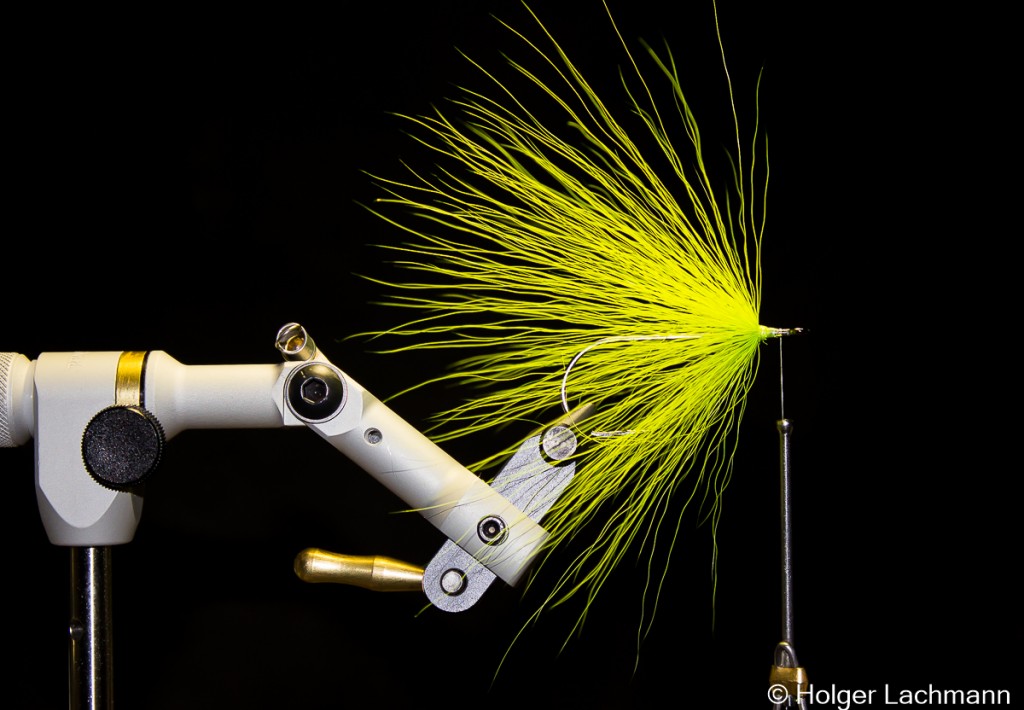 First, do a collar with Bucktail
First, do a collar with Bucktail
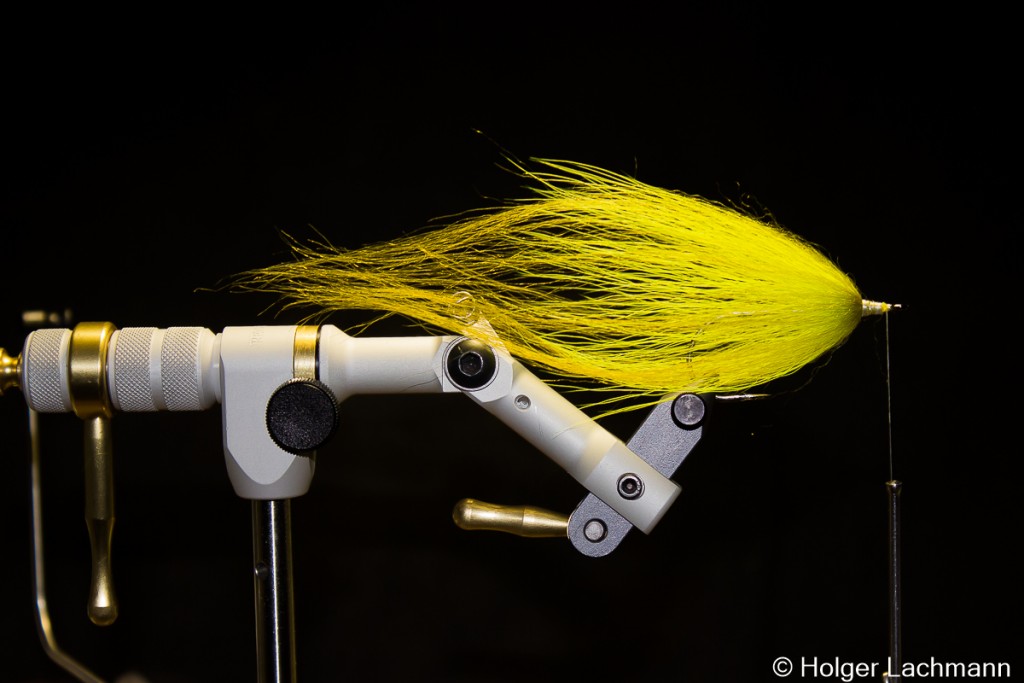 Take a bunch of Nayat and tie it around the Bucktail collar.
Take a bunch of Nayat and tie it around the Bucktail collar.
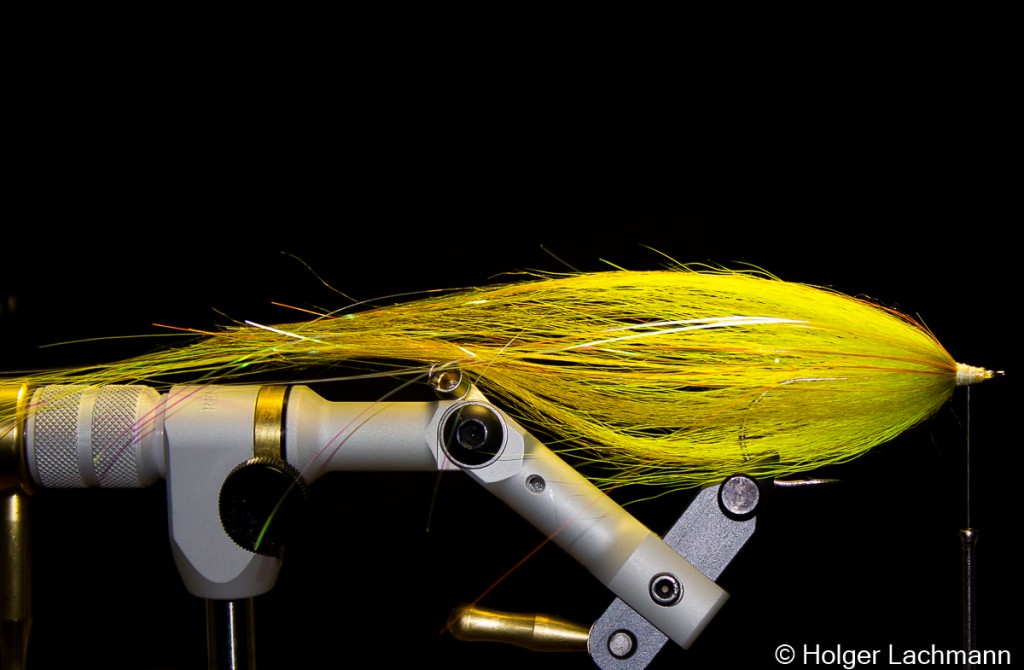 Some fibres of Curled Big Fly Fibre Flash over the Nayat
Some fibres of Curled Big Fly Fibre Flash over the Nayat
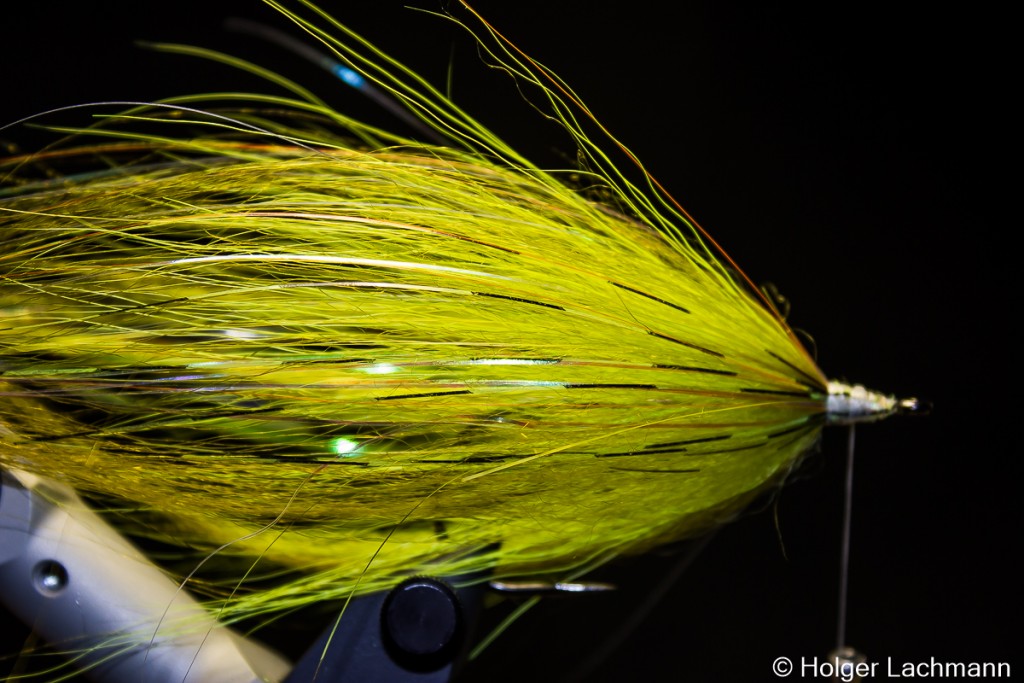 And some Grizzly Barred Flashabou to give some contrast. Super easy and it looks awesome!
And some Grizzly Barred Flashabou to give some contrast. Super easy and it looks awesome!
You can find the materials by clicking onto the following links (choose between german and english language):